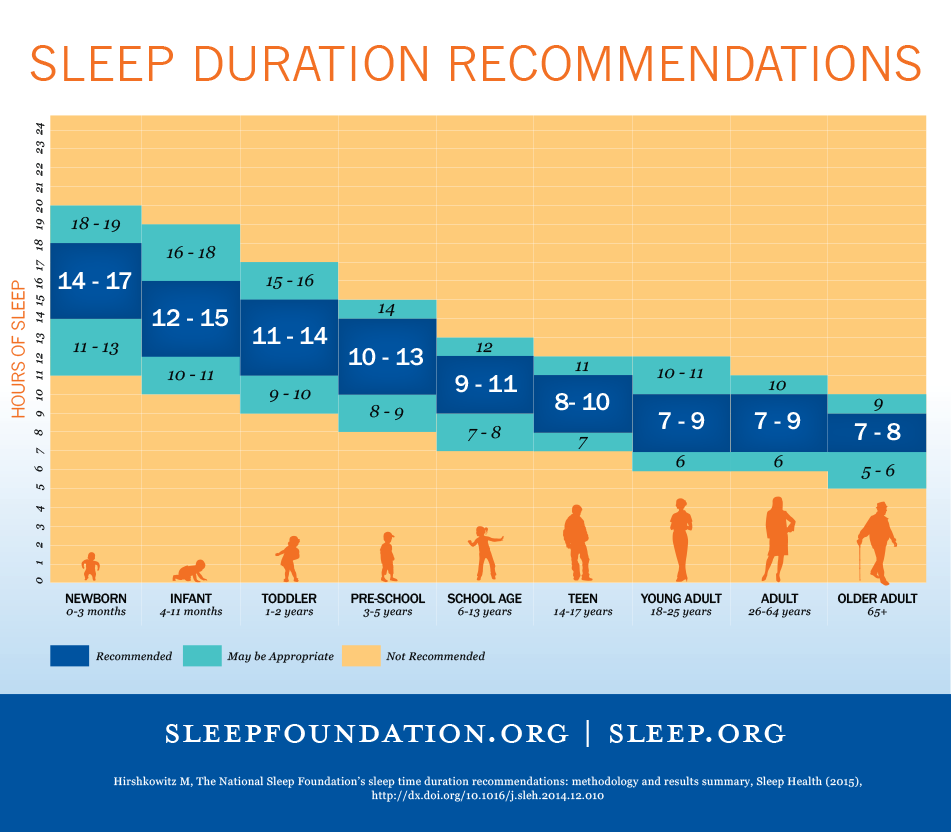
Good Night, Sleep Tight
Adequate sleep is important to our health and well-being. While it is not uncommon for people to suffer from occasional sleep disturbances, insomnia or chronic sleep problems can have adverse effects on our learning, memory, thinking, attention, and emotions. It can affect our school and job performance and lead to errors and accidents in our daily life. Recent studies have even shown a link between inadequate sleep and a variety of serious health problems, such as obesity, diabetes, hypertension, and depression.
Before tackling insomnia and making “getting a good night’s sleep” come true, we need to first understand its types and causes, in order to apply the right strategies to improve our sleep.
Symptoms of Insomnia
Insomnia is not just defined by the number of hours you sleep every night, which means that a short sleep duration does not equal to having insomnia. According to the National Sleep Foundation’s suggestion, while most adults need between 7 to 9 hours of sleep a night, the amount of sleep an individual needs also varies according to their personal conditions and habits. Besides, the gradual decrement of sleep duration as we grow older also occurs naturally (see the below graphic). For instance, older adults need a relatively shorter sleep duration.

Hence, insomnia is not defined by sleep duration. The followings are some symptoms of insomnia:
- Difficulty in falling asleep, such as taking more than 30 minutes to fall asleep
- Waking up frequently during the night and having trouble going back to sleep (e.g., taking more than 30 minutes to fall asleep again)
- Waking up too early in the morning (e.g., 1 to 2 hours earlier than normal waking time) and having trouble going back to sleep
- Feeling tired and unrefreshed when awake
Types and Causes of Insomnia
There are two common types of insomnia, including
- Acute insomnia (short-term)
- Can last from one night to a few weeks
- Often caused by emotional or physical discomfort, and can be related to a single specific event
- Causes of acute insomnia include: significant life stress (e.g., death of loved one, breakup of relationship, exams), illness, environmental factors like noise, light, extreme temperatures, and experiences that disrupt a normal sleep schedule (e.g., jet lag, moving into hostel)
- Chronic insomnia (long-term)
- Diagnosed when a person experiences insomnia at least 3 nights a week for one month or longer
- Often occurs along with other health problems and can be caused by many conditions such as depression, long-term stress and pain
How could I get a Good Night’s Sleep?
For most people, sleep disturbances are often caused by health problems or psychosocial stressors. In treating insomnia, it is important to identify the root of the problem and to actively deal with it.
In the meantime, however, the following are some general suggestions which may improve your sleep:
“Work at sunrise and rest at sunset “
- Stick to a regular sleep schedule. Go to bed and wake up at around the same time each day.
Don’t take naps
- Try to avoid taking naps during daytime (especially after 3:00p.m.) since it may make you less sleepy at night.
Avoid stimulants
- Avoid caffeine, nicotine, and alcohol late in the day. The caffeine in coffee, colas, teas, and chocolate and nicotine in tobacco are stimulants and can keep you awake. Alcohol can also interfere with sleep quality.
Avoid heavy meals and beverages before sleep
- A large meal can cause indigestion that interferes with sleep.
- Drinking too much fluid at night can cause you to wake up frequently to urinate.
- However, a light snack before bedtime may help you sleep better.
Exercise regularly
- Exercise may help you sleep, However, try to avoid exercising within 3 hours before bedtime since it may stimulate you and make it harder for you to fall asleep
Take time to unwind
- Follow a daily routine to relax and unwind before sleeping, such as taking a bath, watching TV, listening to music, or doing relaxation exercise
Maintain a comfortable sleep environment
- Make sure that your sleeping place has all the necessary physical comforts, i.e. the room is dark and quiet with the right temperature, your bedding is clean and comfortable, etc.
Pair your bed up with sleepiness
- Your bed is a place to sleep and rest only, don’t use it for studying, working, or thinking.
- If you have been lying in bed for 30 minutes without being able to fall sleep, you may try the following: 1) leave your bed and do something relaxing, such as reading a book; 2) after about 15 minutes, go back to your bed and try to fall asleep again; 3) if you still cannot fall asleep, repeat the procedure of 1) and 2).
Manage your worries
- If you have a tendency to worry about things while lying awake, get up and write them down or try to make a “to-do” list. This may relieve you from those worries for the night and allow you to sleep with greater peace of mind.
Overcome your fear of insomnia
- If you can’t fall asleep and don’t feel drowsy, try not to worry about how it may affect you on the following day. In fact, you may have experienced multiple times where you were still able to handle your work responsibilities, even on occasions when you didn’t sleep well or get much sleep.
If your sleep problem persists or deteriorates despite your own efforts to overcome it, or causes difficulties in handling daily responsibilities (e.g., you find it hard to concentrate at work or to attend lessons), don’t hesitate to consult a medical doctor or counsellor.




